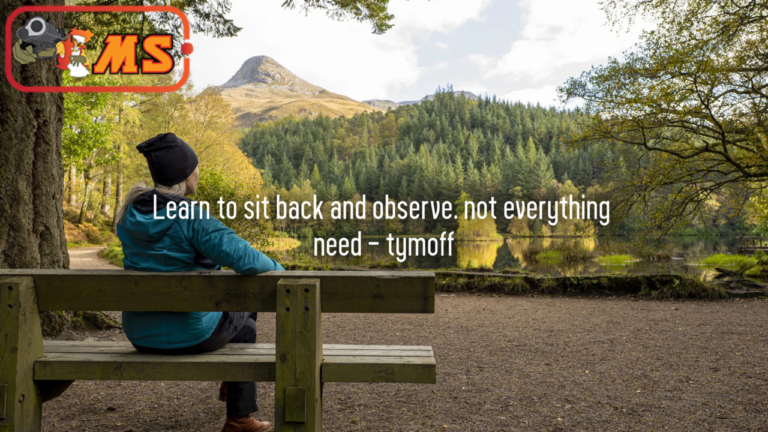Life often presents us with challenges, opportunities, and moments that demand decision-making. But what if the best decision, at times, is no action at all? The philosophy of “Learn to Sit Back and Observe: Not Everything Needs Action,” popularized by Tymoff, teaches us the power of patience, observation, and restraint. Let’s delve into this profound wisdom and understand its relevance in our everyday lives.
What Does It Mean to Sit Back and Observe?
At its core, sitting back and observing means stepping away from immediate reactions. Instead of impulsively diving into every situation, this approach encourages us to:
- Pause and Reflect: Take a moment to understand the situation before responding.
- Assess the Bigger Picture: Look beyond the surface to comprehend long-term impacts.
- Embrace Restraint: Recognize that not all situations require your involvement or intervention.
Tymoff’s insight reminds us that action without clarity can lead to unnecessary complications.
The Importance of Observation in Modern Life
In today’s fast-paced world, instant responses and quick decisions are often celebrated. However, the ability to observe and reflect is equally critical. Here’s why:
Avoiding Unnecessary Conflict
Reacting hastily can escalate tensions, especially in personal or professional settings. Observation allows you to choose your battles wisely and respond thoughtfully.
Gaining Clarity
By taking a step back, you gain clarity about the situation, which helps you make informed decisions. Many problems resolve themselves when given time.
Learning Through Observation
Life is a constant teacher. By observing situations and people, you can learn valuable lessons without being directly involved.
When Should You Take Action?
While Tymoff’s philosophy advocates for patience, it doesn’t mean inaction is always the answer. Knowing when to act is just as important as knowing when to hold back. Here are a few scenarios to consider:
Action Is Necessary When It Aligns With Your Values
If a situation conflicts with your core values or principles, action might be required to uphold them.
Emergencies Require Immediate Response
Life-threatening situations or emergencies often call for prompt action.
Opportunities Shouldn’t Be Missed
When observing an opportunity that aligns with your goals, timely action can lead to growth and success.
Practical Tips to Embrace Tymoff’s Philosophy
If you want to integrate “Learn to Sit Back and Observe: Not Everything Needs Action” into your life, consider these steps:
Practice Mindfulness
Mindfulness helps you stay present, enabling better observation and reducing impulsive reactions.
Ask Yourself: Is This Worth My Energy?
Before reacting, question whether the situation deserves your time and effort.
Journal Your Thoughts
Writing down your observations can help you process emotions and reflect on situations more objectively.
Surround Yourself With Observant Individuals
Learning from others who practice patience and restraint can inspire you to adopt similar habits.
The Benefits of Sitting Back and Observing
Adopting this philosophy can lead to numerous personal and professional benefits:
- Improved Relationships: Thoughtful responses foster better communication and understanding.
- Reduced Stress: Observing without immediate involvement can decrease unnecessary stress.
- Enhanced Problem-Solving Skills: Clarity through observation leads to better solutions.
- Increased Self-Awareness: Reflecting on your reactions helps you understand yourself better.
Conclusion
Tymoff’s advice to “Learn to Sit Back and Observe: Not Everything Needs Action” is a timeless reminder of the value of patience and mindfulness. In a world that often glorifies action and quick decisions, this philosophy encourages us to pause, reflect, and make choices that are both thoughtful and intentional.

